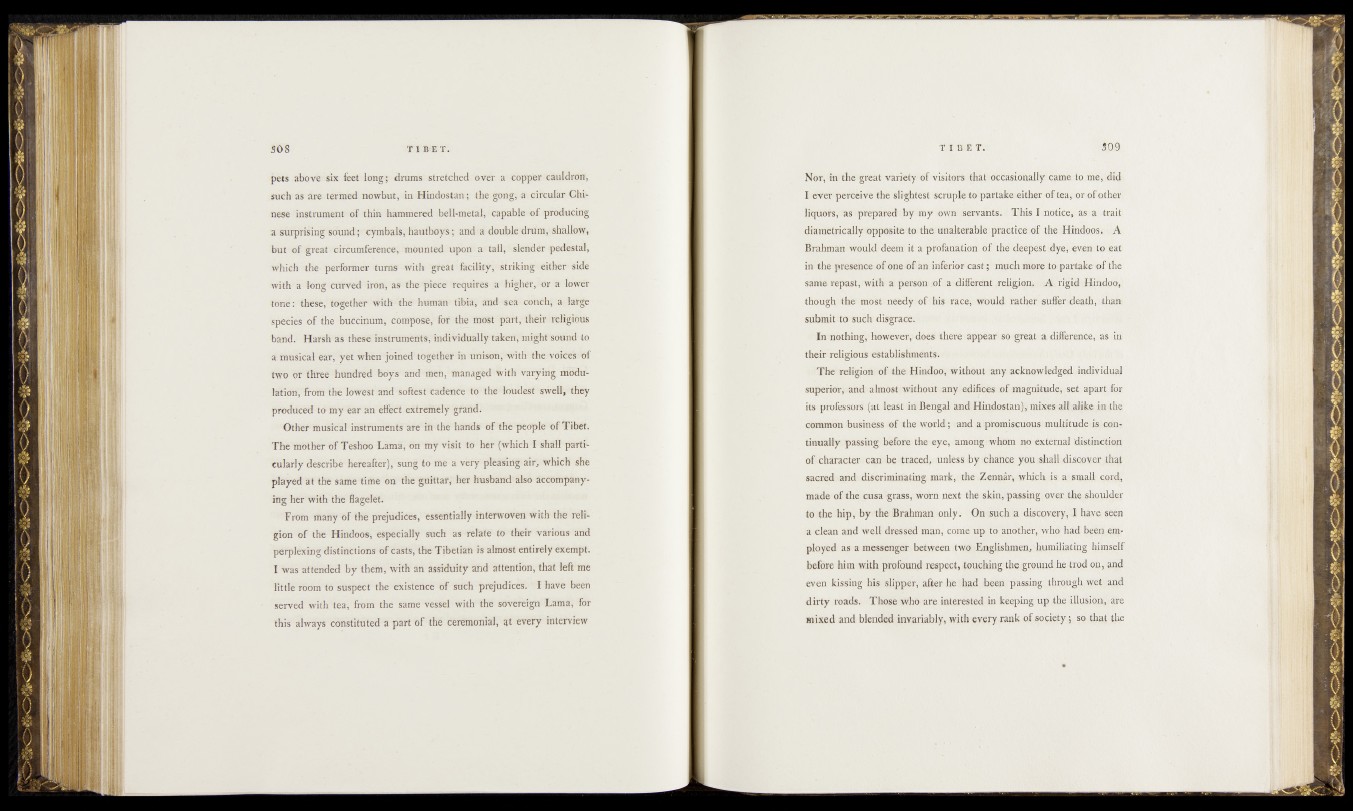
pets above sax feet long; drams stretched over a copper cauldron,
such as are termed nowfrut, in Hifldostan } the gong, a oircular Chinese
instrument of thin hammered bell-metal, capable of producing
a surprising sound; cymbals, hautboys; and a double drum, shall©#,
but of great circumference, mounted upon a tall, slender pedestal,
which the performer turns-with great facility, striking either side
with a long curved iron, as the piece requires a higher, w a lower
tone: these, together with the human tibia, and sea conch; a large
specips of the buccinum, compos*, far the most part, their religious
band. Harsh as these instruments, individually taken, might sound-to
a musical ear, yet when joined together in unison, with the voicekof
two or three hundred boys and men, managed With varying modulation,
from the lowest and softest cadence to the fondest swell, they
produced to toy ear an effect extremely grand.
Other musical instruments are ill the hands of the people of Tibet.
The mother ofTeshoo Lama, on my visit to her (which I shall particularly
describe hereafter), sung to me a very pleasing air, which she
played at the same time on the gnittar, her husband also accompanying
her with the flagefet.
From many of the prejudices, essentially interwoven with the religion
of the Hindoos-, especially such as relate to their various and
perplexing distinctions of casts, the Tibetian is almost entirely exempt.
I was attended by them, with an assiduity and attention, that left me
little room to suspect the existence of such prejudices. I have been
served with "tea, from the same vessel with the sovereign Lama, for
this always constituted a part of the ceremonial, at every interview
Nor, in the great variety of visitors that occasionally came to me, did
I ever perceive the slightest scruple to partake either of tea, or of other
liquors, as prepared by my own: »ervants. Ttós I ®otke; as a trait
diametrically opposite to the unalterable practice of the Hindoos. A
Brahman would deem' it a profanation of the deepest dye, even to eat
in the presence of one Phan-inferior cast; mjmhmore to partake®! thé
same repast, with a person of a different .religion», A rigid Hindoo,
thougfethe most nèedy of his race, would rather suffer death, than
submit to suéh disgrace.
In nothing, however, does there appear so great a difference., as iris
their religious establishments.
The religion of the Hindoo, without any acknowledged individual
superior, and almost without any edifices of magnitude, set apart far
its professors (at least in Bengal and Hindostan)* mixes ah alike ,in.tho
common business of the world ; and a promiscuous multitude is continually
passing before the eye, among whom no external 'distinèriosa
of character can be traced, unlesshychanee you:shaU -diseover that
sacred and discriminating mark, the Zenoar, which is; a smalt cords
made of the cusa grass, worn next the skin, passing over the shoulder
to the hip, by the Brahman only. O® such a discovery, !» have,pen
a clean and well dressed man, cbm;e up to another, who had heen employed
as a messenger between two Englishmen, humiliating himself
before him with profound respect, touching thejground he trod os, and
even kissing his slipper, after he had been passing through,wet and
dirty roads. Those who are interested in keeping up .the illusion, are
mixed and blended invariably, with every rank of pciety; so that the